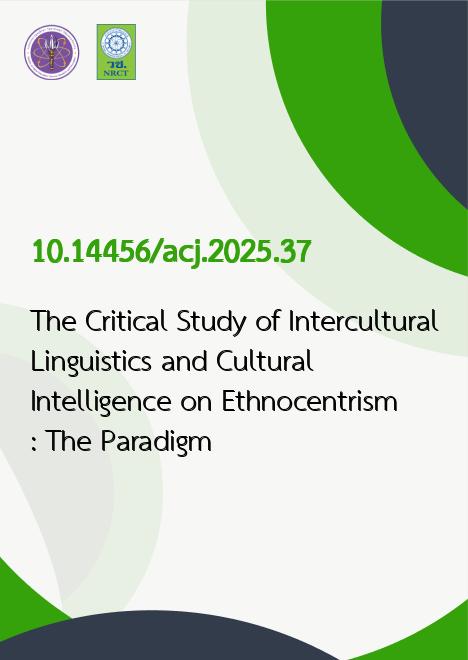
|
The Critical Study of Intercultural Linguistics and Cultural Intelligence on Ethnocentrism : The Paradigm |
|---|---|
| รหัสดีโอไอ | |
| Creator | Chaleomkiet Yenphech |
| Title | The Critical Study of Intercultural Linguistics and Cultural Intelligence on Ethnocentrism : The Paradigm |
| Publisher | The Office of Arts and Culture, Surindra Rajabhat University |
| Publication Year | 2568 |
| Journal Title | Arts and Culture Journal of the Lower Moon River |
| Journal Vol. | 14 |
| Journal No. | 2 |
| Page no. | 504-518 |
| Keyword | Cultural Intelligence, Ethnocentrism, Intercultural Linguistics, Paradigm |
| URL Website | https://so07.tci-thaijo.org/index.php/acj |
| Website title | วารสารศิลปะและวัฒนธรรมลุ่มแม่น้ำมูล |
| ISSN | ISSN 2822 - 0617 (Online);ISSN 2822 - 1141 (Print) |
| Abstract | This research examined how ethnocentrism can contribute to the development of interculturality and cultural intelligence among English as a Foreign Language (EFL) students in Thai higher education. The research aims to investigate the ethnocentric factors that drive intercultural linguistics and cultural intelligence development: 1) identify aspects of ethnocentrism that encourage interculturalal linguistics and cultural intelligence, 2) analyze and determine the components of intercultural linguistics and cultural intelligence within ethnocentric contexts, and 3) propose the effects of ethnocentrism on students’ awareness of intercultural linguistics and cultural intelligence. Using mixed methods, the study began with interviews of five intercultural communication experts, followed by data collection from 503 EFL students across six Rajabhat Universities using stratified sampling. Factor analysis revealed two components : cultural diversity navigation skills and intercultural experience-based learning, both showing strong reliability. Results indicated that ethnocentric awareness became more effective when taught through inclusive pedagogy aimed at developing empathy and intercultural competence. The study proposed a framework positioning ethnocentrism as a reflective tool for language education, offering implications for curriculum development and policy formulation. |